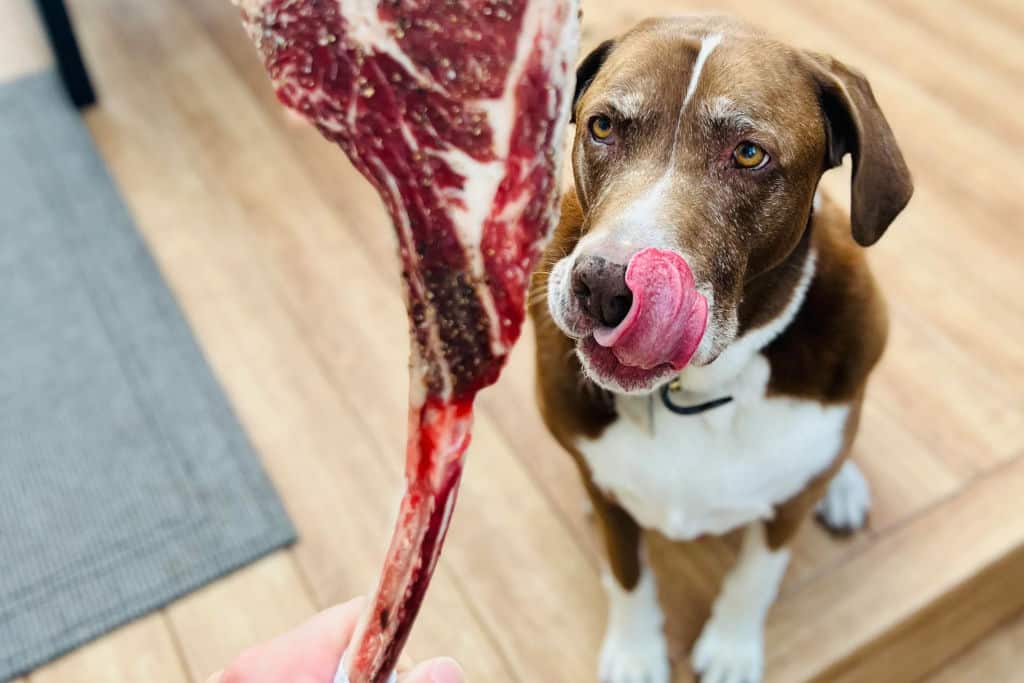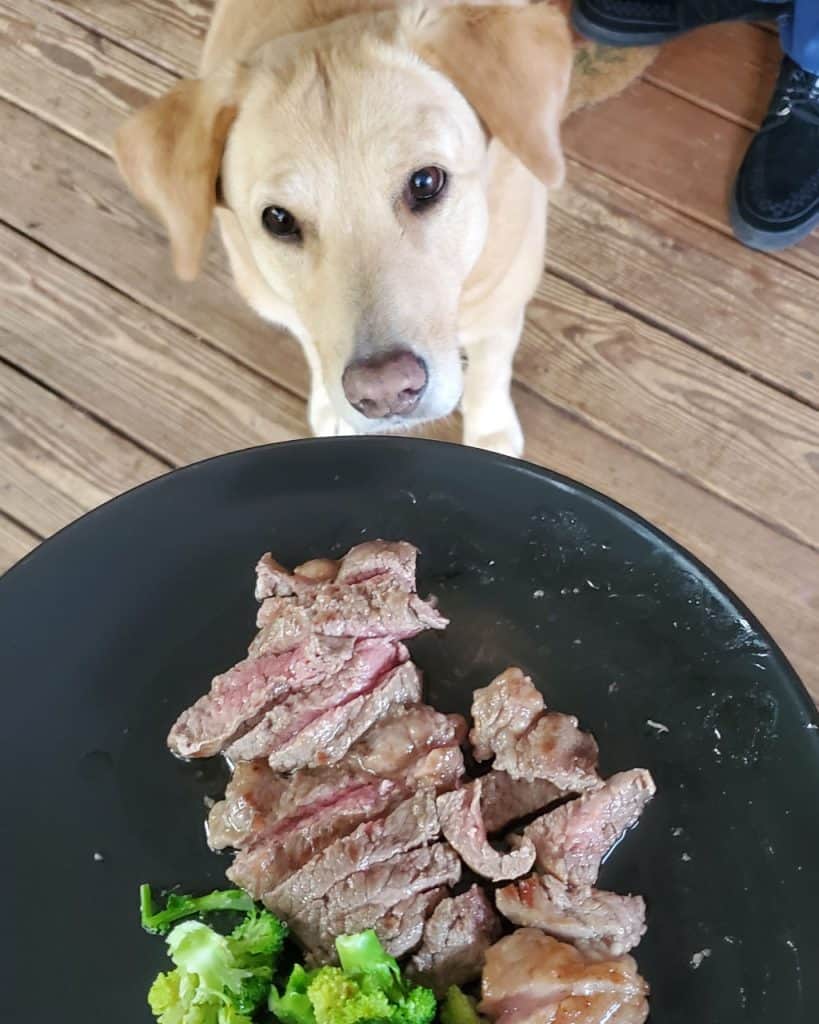Disclosure: We may earn a commission from helpful, relevant links in our content. No cost to you. See our privacy policy.
Countless years of adaptation have transformed dogs into carnivore scavengers, which means they want meat, but they’ll eat whatever they can scavenge until meat is available again. These basics serve as the foundation for the triggers and mechanisms of behavior and survival.
It’s a primal yearning passed down from their ancestors. It’s the natural smell and texture, unlike kibble, which is artificial.
But is it healthy for them? And what about types of meat? Let’s explore this.

Why Do Dogs Love Meat So Much?
Dogs enjoy eating meat because it was readily available for thousands of years during their evolution. It was always high in nutritional value. It also smelled delicious, and since dogs prefer to sniff food rather than taste it, this appealed to them.
Historically, the nutrients in meat helped canine ancestors heal quicker, offering them a survival edge in the wild.
Dogs have a better sense of smell than they have of taste. And in their evolutionary past, lingering over food meant that a larger, more muscular dog stole it. The fats in meat release aromatic compounds when cooked, activating dogs’ strong olfactory senses, explaining their eager anticipation during our BBQs.
My dogs always surround me when I cook any meat in the kitchen. They smell it, seek it, and enjoy it when I prepare a meal for them.
Dogs and humans have both evolved to the omnivore end of the spectrum. Domestication has brought dogs there. They’ve been around for tens of thousands of years, so their minds still crave meat more than their bodies do. But humans are heavily involved in their evolution path, so who knows what the future holds.
What Types of Meat Do Dogs Like the Most?
What the dog likes will depend on the dog’s breed and how you prepare the food. Whether it’s raw meat, cooked or canned meat, dog preferences will vary.
Generally, no type of meat is better than another for the dog. It comes down to whether your dog loves it, whether it sits well in their stomach, and whether it is an economical option for you. Though chicken and turkey are commonly loved, did you know that some dog breeds inherently enjoy fish due to their coastal origins?
Some meats are also fattier than others, which can be an issue for dogs who are obese, which may be another reason their owners are looking for different proteins.
Some dogs may be allergic or sensitive to various types of meat. Others have discovered that some appear to improve their dog’s coat/skin. These proteins may also be priced differently. Venison, for example, is frequently more expensive than beef or chicken.
Start by using a typical meat item such as beef, chicken, or turkey. Try to reserve some of the more exotic meats, such as deer, bison, rabbit, and so on, if your dog has been diagnosed with food allergies and must go on an elimination diet with food containing a novel meat protein source.
Aside from allergies, some dogs may be picky. To incorporate extra Vitamin E/Omega 3s into my dog’s diet, I decided to try switching to a food with a salmon basis instead of chicken. That did not go down well, and I had to change to something more to my dog’s liking.
After I realized the same thing with Blue Buffalo, my vet recommended the Purina Pro Plan. My dog like it, and his coat has improved dramatically after converting.
Do All Dogs Like Meat?
Most dogs like meat. Some dogs like meat cooked, others raw. While raw food benefits most animals, some dogs may not take it well. In some circumstances, the remedy is to heat the raw food for fifteen minutes at 225 degrees. In others, canned food works better.
However, you should not feed raw without consulting a trained veterinary nutritionist since doing so risks causing health problems in your pet owing to nutritional imbalance.
While we often assume all dogs lust after meat, some, due to unique experiences or health conditions, may be indifferent or even averse. Remember, if your dog turns away from a particular meat, it’s not stubbornness. It’s them communicating a preference or potential discomfort.
Knowing your pet has a “sensitive stomach” is often required in deciding the type of food that is best for the pet. Try the food and keep an eye on your pet’s reaction.
Is Red Meat Healthy for Dogs?
Red meat is generally healthy for most dogs. However, not all dogs can consume raw meat. Due to medical issues or genetics, some animals require a highly processed diet. They may be deficient in some way, making it difficult to digest raw foods.
Protein in optimal levels, found in most raw foods, keeps the carnivore’s body functioning properly, at the optimum pH for blood and urine, and can improve many body processes. Raw meals are high in moisture and promote appropriate GI motility.
A New Zealand study found that high-meat diets are easier for dogs to digest. They can absorb more nutrients from a high-meat diet, and dogs with more gut bacteria help them digest protein and fat.
Some owners have discovered that if their dogs are consistently fed the same food taste (like dry dog food), they can develop an allergy to that protein source. According to my research, chicken is the most prevalent protein type to cause this. To avoid this, you should rotate your dog’s diet.
Dogs do poorly on strictly vegetarian or strictly all-meat diets. It is ideal for offering your dog a varied diet that includes animal and plant products. Different breeds of dogs require varying amounts of meat in their diets.

As far as cooked vs raw meat, both are options. For the raw meat diet, according to Steve Brown’s “Unlocking the Ancestral Diet,” a raw diet may look like this: Protein (49%), Fat (44%), and Carbohydrate (6%).
For home-cooking dog foods, Barbara Royal, The Royal Treatment’s author, recommends that meat comprise 60-75% of the total diet, vegetables/fruits 15-25%, and fat 10-30% (the majority of which comes from meat). To ensure a good calcium-to-phosphorus ratio, every meal should include a bone meal (1,000 grams per pound of meat-based cuisine) or finely crushed bones.
If we don’t provide our pets with what they need and they can’t get it another way, they will become unwell.
What Happens if a Dog Does Not Eat Meat?
When meat is removed from a dog’s diet, they may struggle to receive adequate protein.
Dogs require more protein in their diet than people do. Otherwise, dogs can become severely unwell if they do not get enough. A carnivore who does not consume meat may suffer from health problems.
Dogs are omnivores, but only because they can eat some plants when hungry. Their favorite food is meat, and they have evolved to consume meat to stay healthy.
However, this also means you can feed them foods other than meat. It doesn’t mean they will thrive on such food, so balanced dog food is usually best for most dogs.
Can Dogs Be Vegetarian or Vegan?
We know that dogs are omnivores and can survive on meatless diets, but whether they can thrive is a different question. According to AKC, “dogs have no real need for fruits or vegetables as part of their diet, but an occasional fruit or veggie as a treat is OK.”
A dog’s digestive system is not designed to handle a high intake of veggies and grains. A dog can live on a diet devoid of animal products, but it must be thoroughly processed and well-balanced. According to Barbara Royal, a dog solely fed rice and raw carrots will die much faster than one with a suitably high-protein, high-fat diet that allows optimal absorption.
On the other hand, according to AKC and PetMD, dogs can thrive without meat, but only if provided a well-balanced vegetarian diet.
Protein or vitamin deficiencies can arise in dogs who consume strictly vegetarian diets if they are not appropriately supplemented. On the other hand, excessive amounts of certain vitamins can cause serious healthy issues. A balanced diet is therefore, key.
FAQs
Do dogs prefer cooked or raw meat?
Depending on the dog, they can prefer both. However, if the owner decides to season the cooked meat, the smell may put them off and cause them to opt for raw meat instead. They usually consume whatever you feed them, but sometimes raw meat may upset their stomach if they’re used to eating cooked meat.
Can dogs eat raw meat every day?
Dogs can generally eat raw meat daily, but the exercise levels, the caloric quantity of foods, and the quality of bio-available nutrients will influence the typical requirements. An approximate meal consumption guide based on raw meaty bones is 15 to 20% of body weight in one week or 2 to 3% each day for the ordinary pet cat or dog.
Can you feed your dog only raw meat?
Feeding your dog only raw meat is not a properly balanced diet and will result in malnutrition. Dogs require a well-balanced diet containing raw meat with the proper nutrients, vitamins, and calcium-to-phosphorus ratio. Raw meat, by itself, needs to have the required balance. You must consult a nutritionist or devise a method to switch her to balanced dog food.
Alex, a passionate animal lover, has experience in training and understanding animal behavior. As a proud pet parent to two dogs and three cats, he founded AnimalReport.net to share insights from animal experts and expand his knowledge of the animal kingdom.




